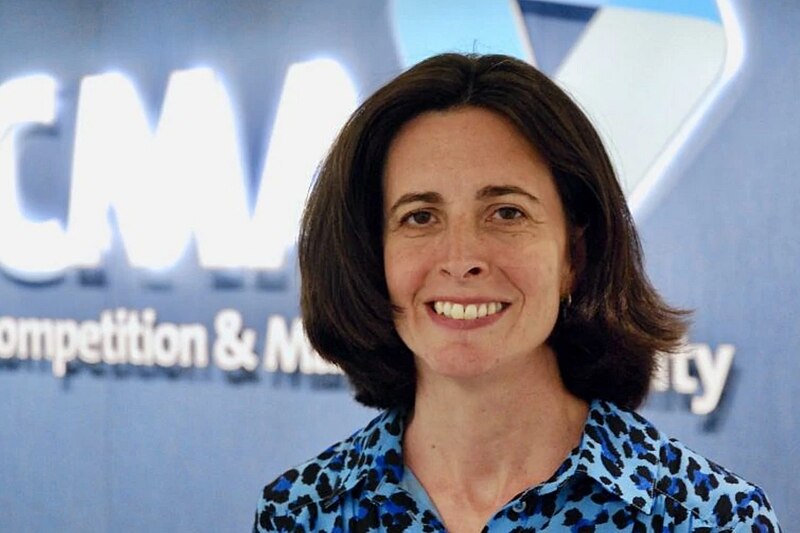Sarah Cardell

Photo courtesy of the U.K. government
Sarah Cardell, who heads up the U.K.'s competition regulator, is concerned that pet owners may be overpaying for veterinary care due to a lack of competition.
The United Kingdom has launched a sweeping probe of its veterinary sector amid concerns that the rapid rise of big corporations may be stifling competition and forcing pet owners to pay unreasonable prices during a cost-of-living crisis.
News of the review, to be conducted by the country's Competition and Markets Authority (CMA), sent the share prices of British corporate consolidators tumbling in a sign investors fear the probe will put a sharp brake on the companies' growth ambitions.
Shares in CVS Group, which owns more than 500 practices in the U.K., plunged an eye-watering 33% in early trading in London today and ended the day down 18%. Shares in Pets at Home, which owns hundreds of veterinary practices and pet products stores, closed 8.6% lower.
Other big hospital owners in the U.K., such as Mars Inc.'s Linnaeus division, IVC Evidensia and VetPartners, aren't publicly listed on the stock market.
The U.K.'s move comes as regulators worldwide grapple with the rising influence of private equity firms and other corporations in a profession that only a decade or so ago was largely comprised of small, independent businesses.
In the United States, the Federal Trade Commission last year forced consolidator National Veterinary Associates to offload 11 specialty and emergency hospitals in the U.S. due to competition concerns. More recently, in France, a court asserted that veterinary practices there must be controlled by veterinarians.
Independent practices accounted for 89% of the U.K. veterinary industry in 2013, according to the CMA. By 2021, the percentage had shrunk to 45%, the regulator said.
Continuing consolidation has more recently been accompanied by a surge in inflation, partly driven by a pandemic recovery and war in Ukraine, that has pushed up the price of everything from grocery items to electricity bills.
The CMA said its review was sparked by concerns that the cost of veterinary care is rising faster than other things —and the possibility that a lack of competition could be to blame.
"Households are under strain from the rising cost of living and it is important that pet owners get value for money from their vets," the regulator said in a statement today. "But figures suggest that the cost of vet services has risen faster than the rate of inflation, which is something that the CMA will be looking into as part of its review."
Pet owners may be unaware that the practice they visit is part of a company that owns hundreds of other practices and additional assets, such as veterinary diagnostic services, the regulator said.
"When a pet is unwell, they often need urgent treatment, which means that pet owners may not shop around for the best deal, like they do with other services," Sarah Cardell, the CMA's chief executive, said in the statement. "This means they may not have the relevant information to make informed decisions at what can be a distressing time."
Responding to the CMA's announcement, CVS said a shortage of veterinarians in the U.K. had pushed up its employment costs. "Our pricing reflects this and other inflationary pressures experienced in recent years," the company said in a statement.
CVS said it aims to "give the best possible care to animals" and that it would work closely with the regulator to support its review. "The group has always sought to ensure its prices are appropriate and reflect fair value to our clients," the company said. "Our pricing structures are set by clinicians to ensure these align with our purpose."
The British Veterinary Association, which represents more than 19,000 veterinarians, said that since human health care in the U.K. is subsidized by the government's National Health Service, some pet owners might be surprised by the size of veterinary bills, which aren't subsidized.
"Vets provide highly specialised, tailored medical care for their patients, however with no NHS subsidies for pets, unexpected bills can seem costly, particularly during this cost-of living crisis, which is impacting both clients and vet businesses," the BVA's president, Dr. Malcolm Morley, said in a statement. "We welcome the CMA's review into veterinary services and look forward to seeing its findings."
The CMA said it would like to hear from veterinarians, veterinary nurses, practice managers and veterinary businesses as it conducts its review. It will provide a further update in early 2024 outlining the issues it has identified and its proposed next steps.
The CMA already has intervened in some proposed acquisitions of general practice veterinary clinics, either blocking them entirely or forcing companies to sell certain assets. But its latest move marks a far more widespread investigation.
Ownership of veterinary practices in the U.S. doesn't appear to be as concentrated as in the U.K., though it's coming close. In December 2021, Chicago-based animal health group Brakke Consulting estimated that about 25% of all companion animal practices in the U.S. were owned by corporate consolidators. But they accounted for at least 40%, and perhaps closer to 50%, of all client visits, it said, because corporations tend to own larger practices than independents, including a majority of U.S. specialist referral centers.
This story has been updated to include a comment from the BVA.